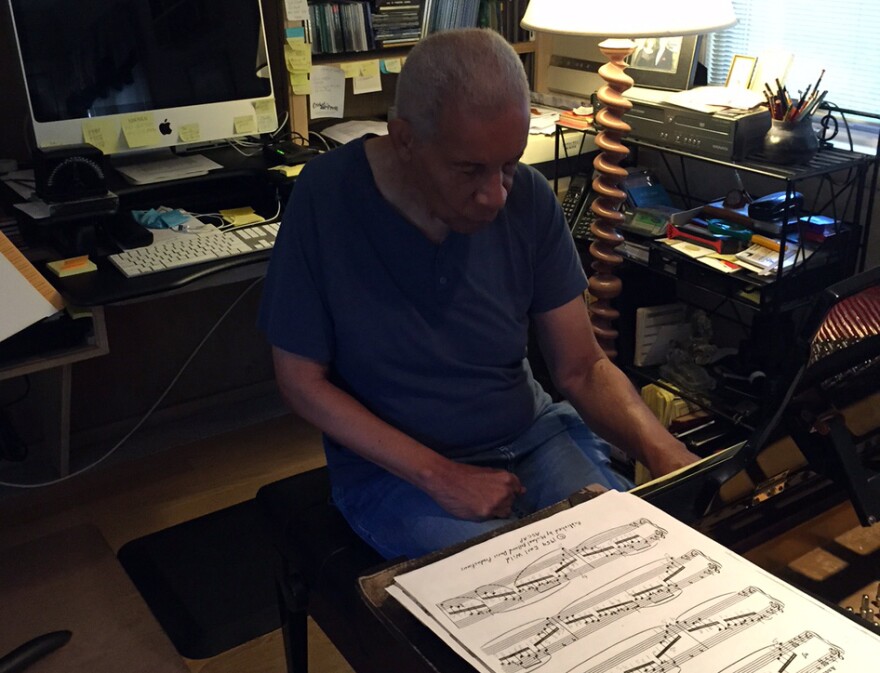When the famous Austrian pianist Paul Wittgenstein lost his right arm in World War I, composers lined up to write works for the pianist featuring the left hand only. One of those works, Maurice Ravel's "Piano Concerto for the Left Hand," will be performed this Sunday by the West Hartford Symphony Orchestra. The soloist for that performance lost the use of his right hand in an unthinkable family tragedy.
Chicago pianist Norman Malone spoke with WNPR recently at the home of Richard Chiarappa, Music Director of the West Hartford Symphony Orchestra.
On this unusually warm and sunny October afternoon, Norman and Richard are working out cues and tempos for Sunday's performance of Ravel's "Piano Concerto for the Left Hand."
Malone sits in front of the keyboard of Chiarappa stands with a giant score draped over the piano. Malone is 78 years old, a tall African American man, whose large left hand easily dances across the piano keyboard in one of the toughest sections of the piece. His right hand hangs limp in his lap, his fingers slightly twisted from decades of atrophy.
Malone started playing the piano when he was five. He said his childhood was consumed with two things: practicing the piano, and steering clear of his violent father.
When Malone was 10 years old, the unimaginable happened. After drugging his wife, Quintin Malone bludgeoned Norman and his two brothers in the head with a hammer as they slept. He then left the house and jumped in front of a passenger train, according to news reports in the both the Chicago Tribune and the Chicago Defender. He was killed instantly.
Miraculously, Norman, his brothers, and his mother all survived.
"Because I was hit on the left side of my head, the paralysis came on the right side of the body," said Malone. "We spent the summer in the hospital. We had to learn how to walk, how to use our left hand because we were all injured in the same way."
Unwilling to accept his fate, Norman said that after the attack, he was itching to get back to playing the piano. "I was just drawn to the piano," he said. "I just sat and tried to finger what I could and make sense out of it. Once I found out there was actually music written for it, I thought, 'Well this is possible.'"
Malone scoured music stores looking for any left hand piano repertoire, and spent hours practicing, first easier pedagogical pieces, and later much harder repertoire.
After being turned down by countless teachers, he found Lester Mather, a piano teacher who challenged him, and gave him the confidence to thrive. Malone auditioned for DePaul University's School of Music with Bela Bartok's "Etude for the Left Hand," and was accepted on the spot.
Watch Malone practice at Chiarappa's home:
Thinking a career as a concert pianist was impossible, Malone majored in music education.
"For one thing, you never heard of a left-handed pianist," said Malone. "Leon Fleischer had an injury and proceeded to do left hand music. Gary Graffman was another one, but you never heard about it. So my chances were very slim."
Malone graduated, and spent 34 years teaching high school chorus. What his choir students didn't know was that in his free time, Malone obsessively practiced piano, working on the most challenging repertoire for left hand piano, including Ravel's "Piano Concerto for the Left Hand," a work that has special meaning for Malone.
"Ravel died in 1937, and that's the year I was born," said Malone. "I thought, 'Ooooh, maybe there is a connection.'"
The Ravel has become a lifelong quest for Malone -- so beautiful, and yet so technically demanding at the same time, he would spend decades perfecting it.
"It's a beautiful piece, and it's hard as hell," he said. "I get close some days, but it's always a challenge."
Until recently, Malone was an unknown talent. But after the Chicago Tribune ran a long feature story on Norman late last year, he finds himself suddenly in demand, cautiously embarking on a new career as a concert pianist at the age of 78.
"I thought about it for a while, and I thought 'Why should you do this?' he said. "I thought, well, it's in your lap, if you don't, you would say later on I had the opportunity, but I let it slip by. So I thought no, keep practicing, keep practicing, and, you know get it done."
Norman Malone performs with the West Hartford Symphony Orchestra on Sunday, October 23 at 3:00 pm, in the Roberts Theater on the campus of Kingswood Oxford School in West Hartford.


